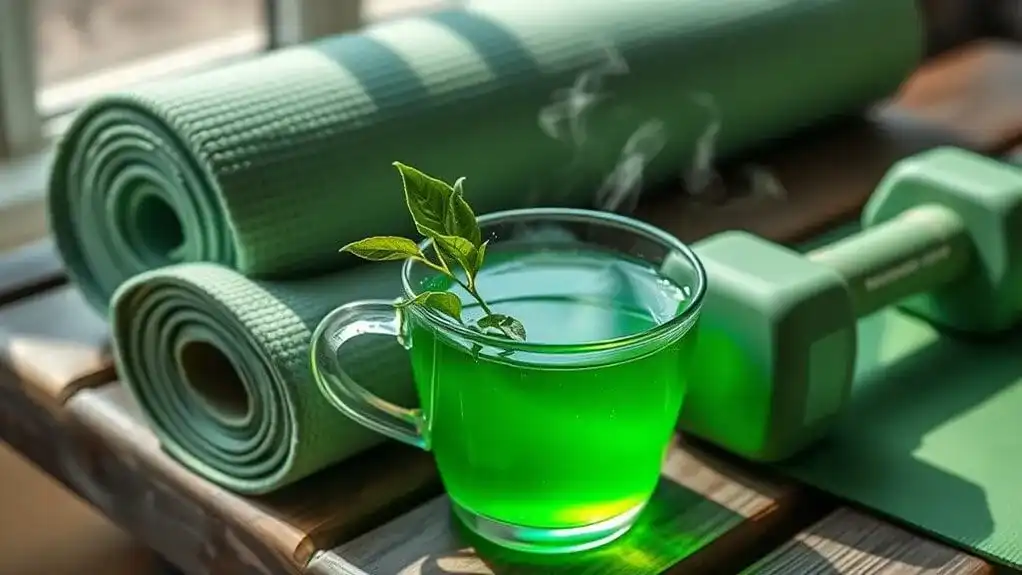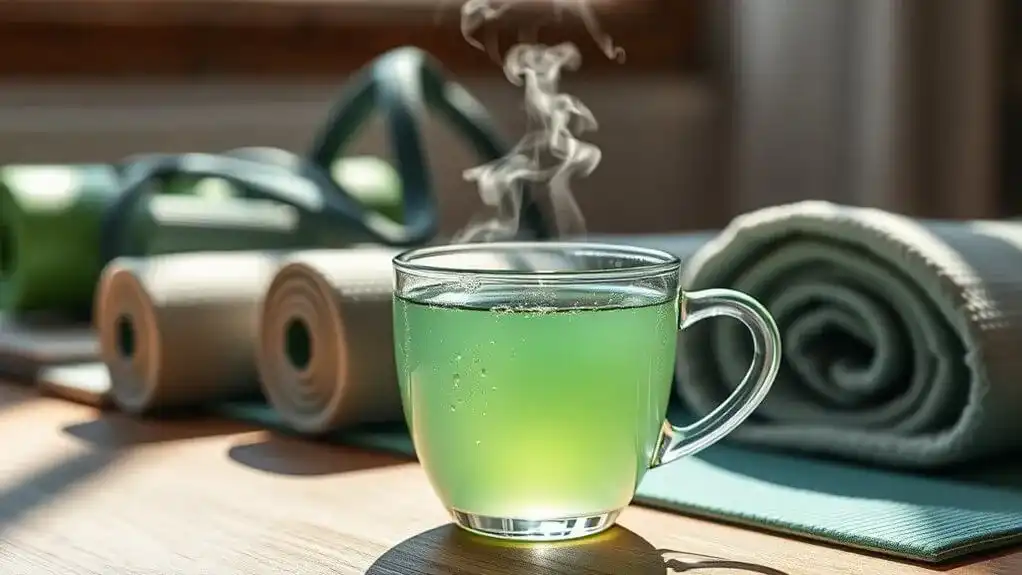Research shows green tea's powerful antioxidants can reduce post-exercise muscle damage by up to 24%. Its catechins and polyphenols work to decrease inflammation and support natural healing processes when consumed within 60 minutes after workouts. Athletes can benefit from drinking 2-3 cups daily or taking 500mg of green tea extract supplements. Understanding the ideal timing and dosage strategies can maximize green tea's recovery-enhancing potential for both endurance and strength training.
Key Points
- Green tea extract significantly reduces muscle damage markers and inflammation after exercise, supporting faster recovery through its antioxidant properties.
- Regular consumption of 2-3 cups daily enhances endurance capacity by up to 24% when combined with training programs.
- Post-workout consumption within 60 minutes maximizes recovery benefits, with optimal dosage being 2 grams matcha or 2-3 cups steeped tea.
- Research confirms that long-term supplementation of 500mg green tea extract daily is more effective than single doses for recovery.
- Green tea's polyphenols, particularly EGCG, combat oxidative stress and improve glucose metabolism during exercise recovery periods.
The Science Behind Green Tea's Recovery Power

While many athletes seek natural ways to enhance recovery, green tea has emerged as a promising supplement backed by scientific research. Studies show that green tea extract helps reduce muscle damage markers after exercise while supporting the body's natural healing processes through its anti-inflammatory properties. Research suggests that consuming 2-3 cups daily is optimal for achieving these recovery benefits. The antioxidant-rich beverage provides essential vitamins and minerals that support overall health.
The science reveals that green tea's antioxidant compounds play an essential role in muscle recovery by protecting against oxidative stress and lowering markers like malondialdehyde. These benefits enhance the body's antioxidant status post-exercise, contributing to better tissue repair. Though green tea doesn't directly reduce muscle soreness sensations, its ability to decrease inflammation and support healing makes it valuable for recovery. Research indicates that supplementing with green tea extract can improve neuromuscular function and reduce fatigue, particularly when timed around training sessions. Research demonstrates that combining green tea extract with regular exercise produces the most substantial improvements in body composition and metabolic health.
Breaking Down Green Tea's Antioxidant Properties

Green tea's powerful antioxidant profile explains its remarkable recovery benefits. As one of nature's richest polyphenol sources, green tea contains approximately 30% polyphenols by weight, with catechins being the predominant compounds. The most notable catechin, epigallocatechin-3-gallate (EGCG), delivers significant antioxidant benefits that help prevent cell damage and support overall health. Studies have shown that EGCG plays a crucial role in glucose and lipid metabolism, which helps improve health outcomes. Regular consumption can lead to enhanced cognitive performance when combined with exercise routines.
Clinical research has shown that effective polyphenol doses typically range from 200 to 1207 mg for optimal benefits. These antioxidant properties prove particularly valuable for athletes, as green tea helps combat exercise-induced oxidative stress and enhances muscle recovery. Studies show that catechin effects are most pronounced when consumed before or between workouts. While the antioxidant content can vary based on brewing methods, regular green tea consumption offers protective benefits against cardiovascular disease, inflammation, and certain neurodegenerative conditions, making it an excellent addition to any fitness routine.
How Green Tea Impacts Muscle Damage and Performance

Research demonstrates that regular green tea consumption greatly reduces exercise-induced muscle damage and enhances athletic performance through multiple pathways. Studies show it lowers creatine kinase levels, a key marker of muscle damage, while supporting muscle repair through its potent anti-inflammatory properties. Athletes supplementing with green tea extract experience improved endurance capacity and reduced fatigue during workouts. The presence of beneficial catechins compounds helps maximize fat burning during strength training sessions.
Green tea's impact on exercise adaptation is particularly significant, as it preserves neuromuscular function and enhances recovery through multiple mechanisms. It stabilizes lipid peroxidation, boosts glutathione levels, and improves overall antioxidant status. However, timing matters – short-term supplementation proves more beneficial than long-term use, as extended antioxidant supplementation might interfere with the body's natural adaptive responses to training. Athletes should also consider individual factors and potential side effects when incorporating green tea into their recovery strategy.
Optimal Dosage and Timing Strategies

To maximize the benefits of green tea for exercise recovery, athletes should focus on strategic timing and proper dosing of their consumption. Research suggests consuming green tea within 60 minutes post-workout provides optimal muscle recovery and rehydration benefits, while pre-workout intake should occur 90 minutes before exercise. Studies indicate that incorporating green tea into post-workout routines can reduce muscle soreness by 48%.
For dosage adjustments, athletes should aim for 2 grams of matcha or 2-3 cups of steeped loose-leaf green tea post-workout. Consumption timing becomes essential later in the day, where doses should be reduced to avoid sleep disruption. While green tea extract supplements can be beneficial at 500 mg/day, they're best used short-term and with food. Athletes should consider their fitness level and exercise intensity when determining their ideal intake, as high-intensity workouts may require additional antioxidant support for effective recovery.
What Current Research Tells Us About Effectiveness

While exercise enthusiasts have long touted the benefits of green tea, recent scientific studies have validated its impressive effects on exercise recovery and performance. Triple-blind placebo-controlled research demonstrates that green tea's antioxidant synergy with exercise greatly reduces muscle damage and oxidative stress markers after training.
Studies show that a daily 500mg green tea extract supplement for 15 days enhances recovery strategies through multiple mechanisms. The polyphenols, particularly epigallocatechin gallate, combat exercise-induced oxidative stress more effectively than traditional antioxidants like vitamins C and E. This exercise synergy extends to improved neuromuscular activation and reduced inflammation, though it doesn't directly affect muscle soreness. Blood markers consistently indicate better recovery in supplemented individuals, making green tea a promising addition to post-workout protocols. These findings are supported by peer-reviewed medical research that demonstrates strong scientific validity through extensive clinical trials.
Best Practices for Athletes Using Green Tea

Athletes seeking to maximize their training benefits can implement specific green tea supplementation strategies backed by scientific evidence. Research suggests a daily intake of 500 mg green tea extract, containing about 137 mg of EGCG per 250 mg serving, optimizes athlete recovery and reduces muscle damage. It's most effective when split into two doses, taken pre- and post-workout. Regular consumption may lead to improved endurance capacity of up to 24% when combined with consistent training.
For those preferring traditional tea, drinking four cups daily provides comparable green tea benefits. Athletes should maintain consistent intake over several weeks, as long-term supplementation proves more beneficial than single doses. When combining green tea with training, it's particularly effective for both endurance and strength activities, helping reduce oxidative stress and inflammation. Athletes should use standardized extracts from reputable sources and consult healthcare providers if they're taking other supplements or medications. The conversion of EGCG to gallic acid in the body activates muscle tissue receptors, making it essential to achieve proper dosing for maximum effectiveness.
Conclusion
Science shows green tea's potent antioxidants work surprisingly well when paired with exercise – a combination ancient cultures somehow knew about centuries ago. Today's research confirms these recovery benefits aren't just folklore. When timed properly with workouts, green tea can reduce muscle damage and enhance performance. While individual results vary, athletes who've made it part of their routine report noticeable improvements in their training recovery.


